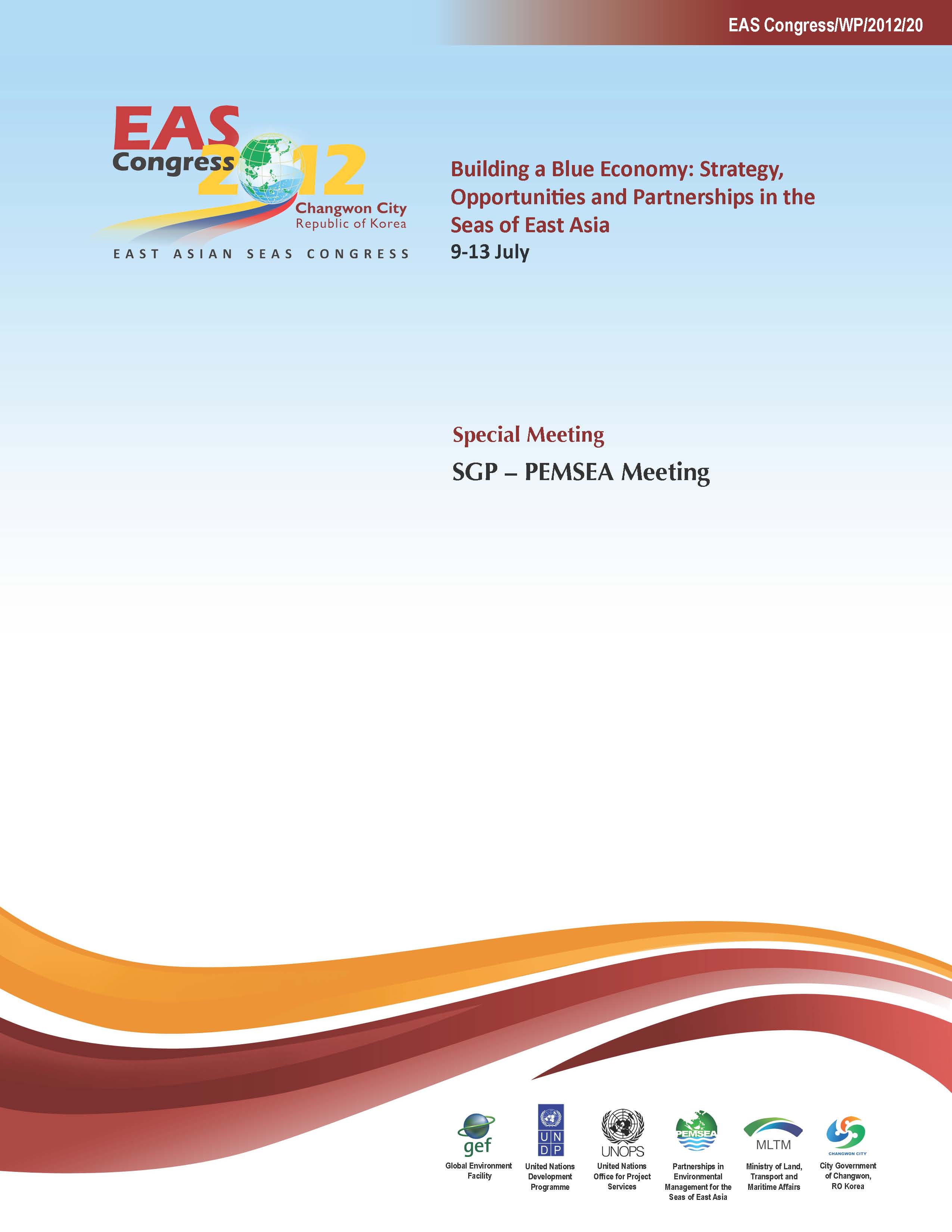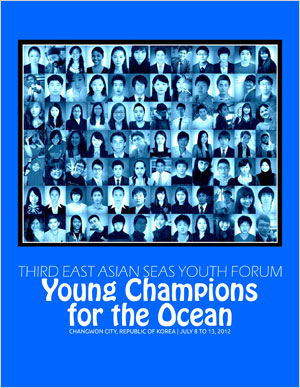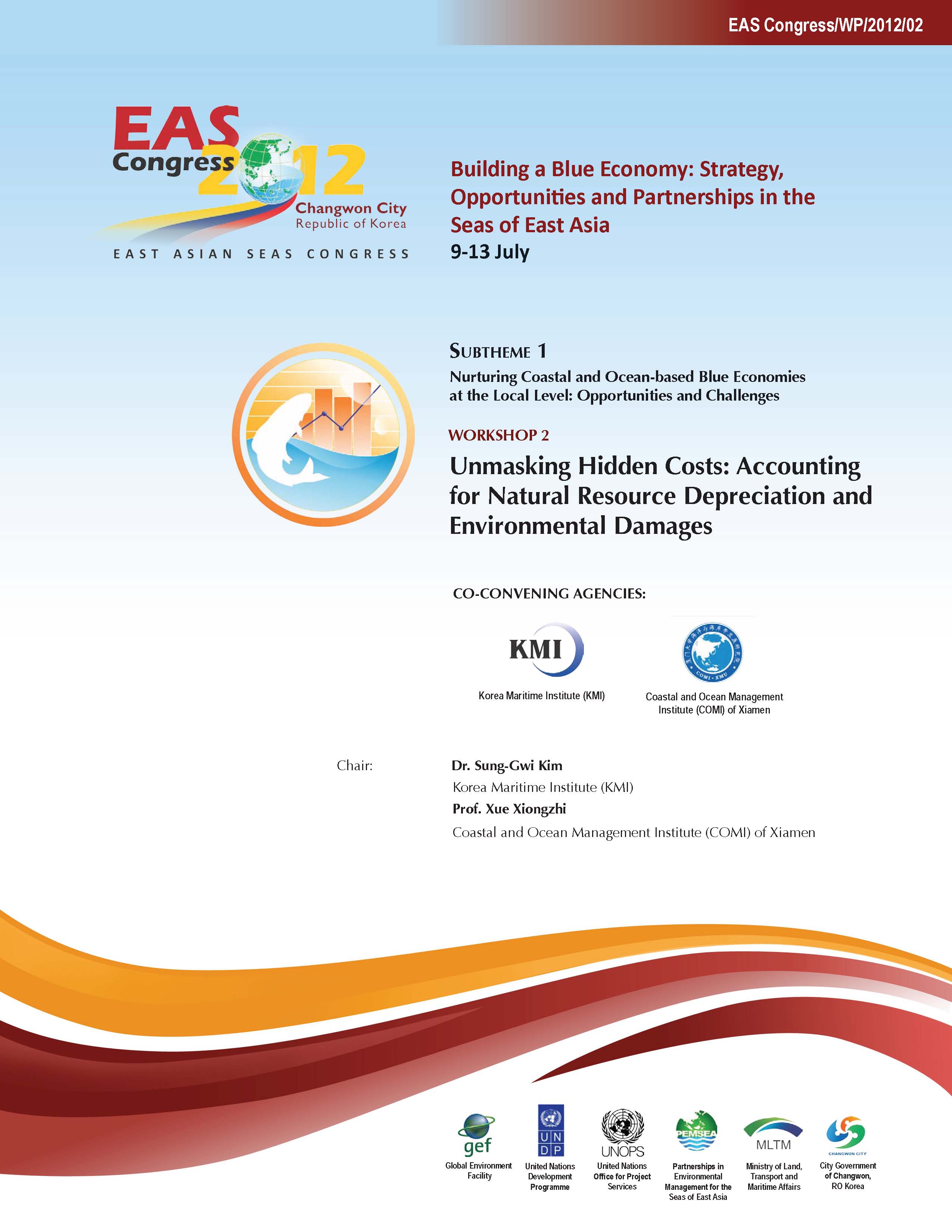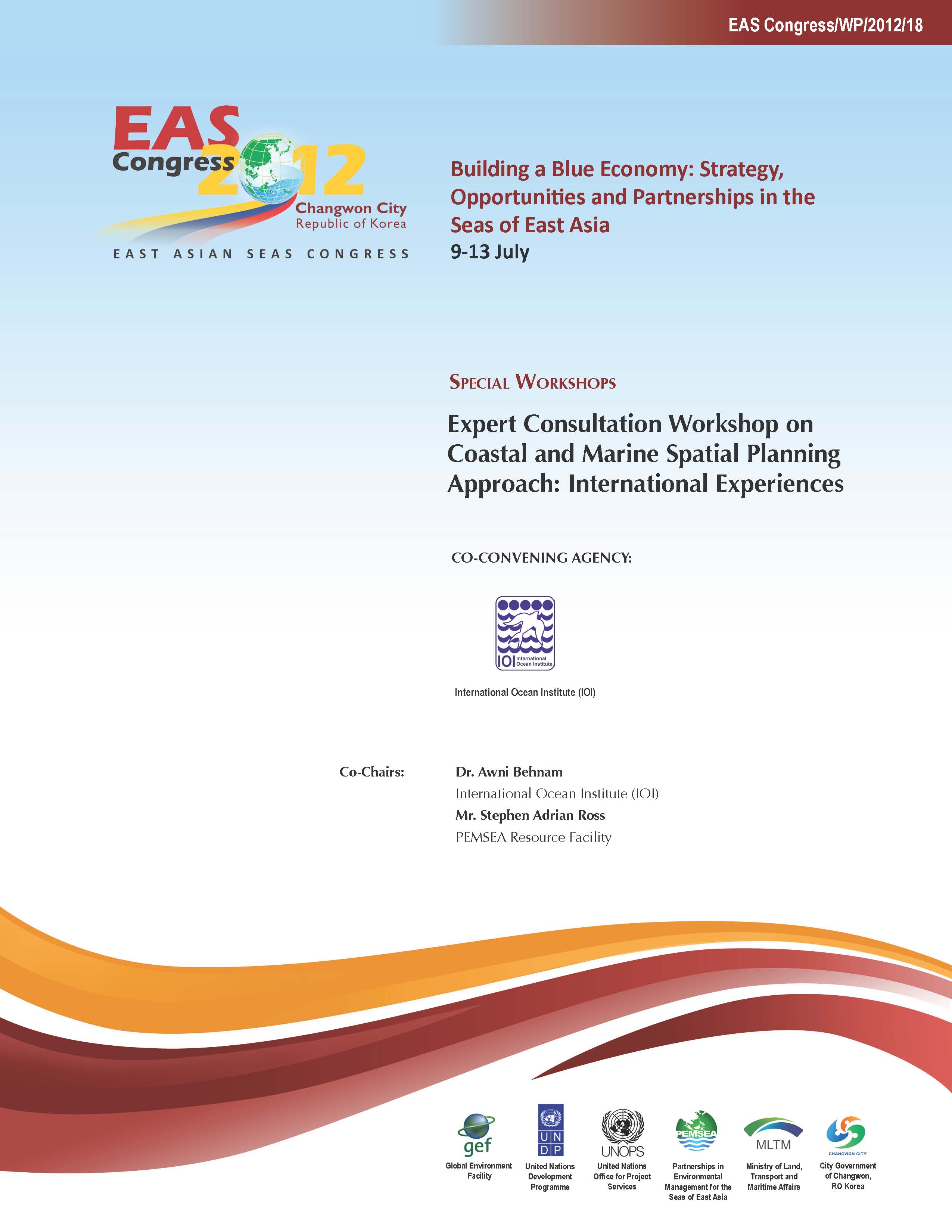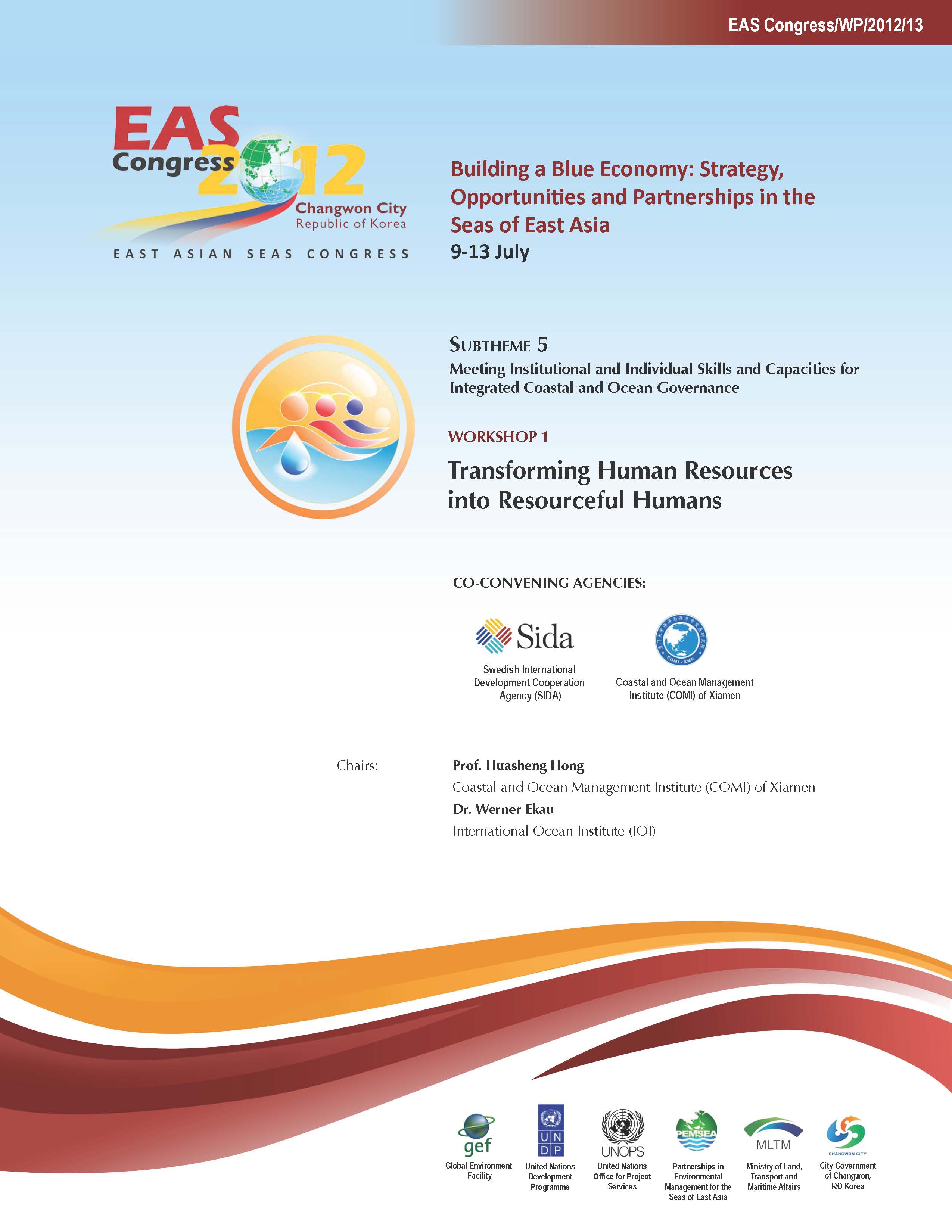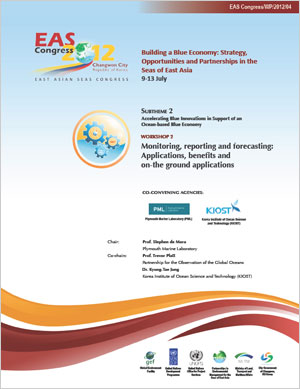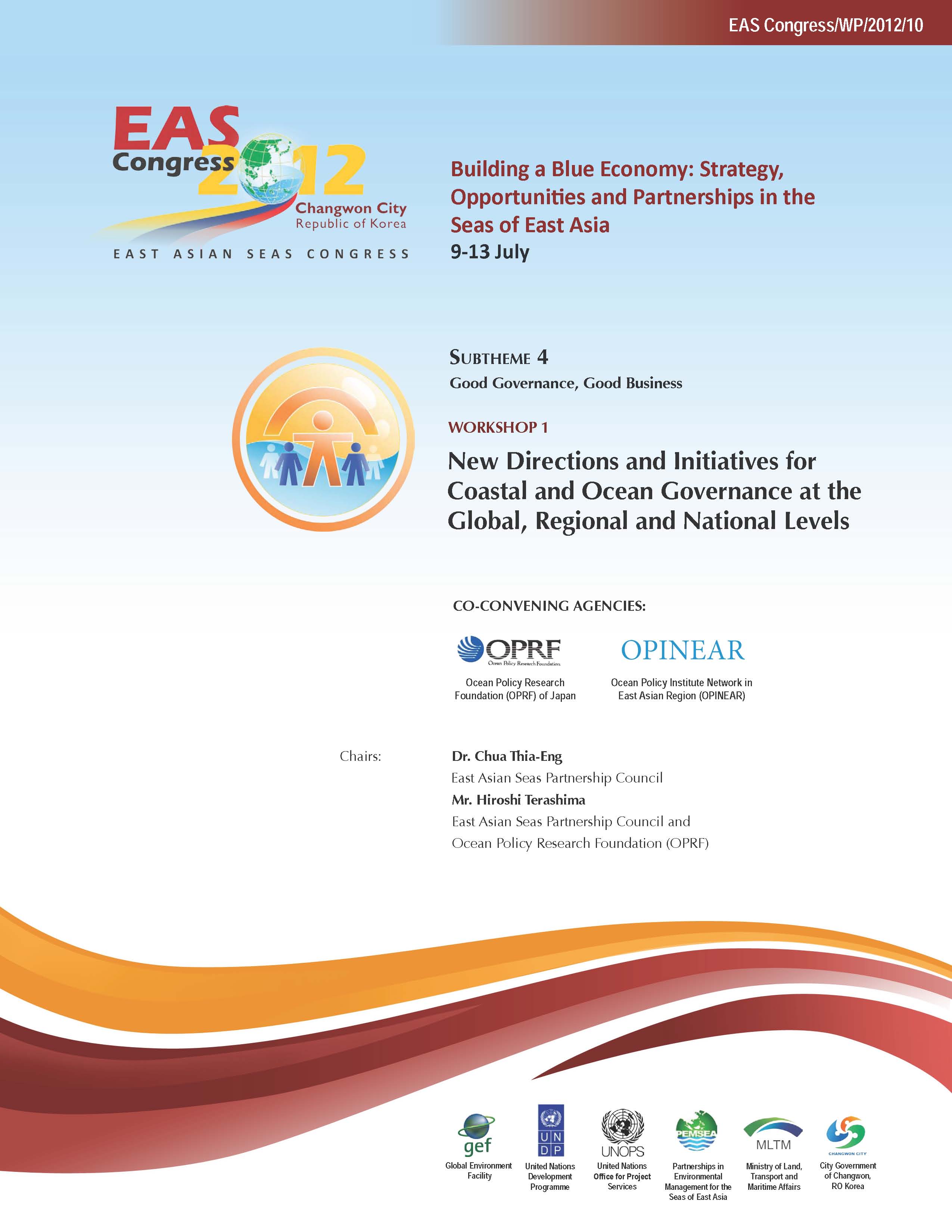
Breadcrumb
-
Proceedings of the SGP-PEMSEA Meeting
This publication summarizes the results of the SGP – PEMSEA Meeting held during the East Asian Seas Congress 2012. This meeting of the Small Grants Programme (SGP) and PEMSEA focal points is a follow-up to the two previous meetings held in 2006 and 2009 to share experiences in implementation and to discuss concerns and challenges in the implementation of the Joint Communique. The meeting aimed to: Share experiences on projects and programs implemented by the SGP; Provide updates on existing programs and projects under the SGP-PEMSEA Joint Communiqué; and Discuss the direction of the partnership for the next five years for inclusion in the next phase of PEMSEA and in the five-year implementation plans of the countries. Expected output of the session included: Community-based experiences disseminated through the SGP-PEMSEA website; Recommendations for the draft five-year plan of the SGP-PEMSEA Joint Communiqué; and Documentation of the meeting for dissemination among partners.
-
Third East Asian Seas Youth Forum Toolkit
This toolkit serves as the overall guide for the Third East Asian Seas (EAS) Youth Forum: Young Champions for the Oceans. It outlines the activities for the Youth Forum and provides useful information on the value of the coastal and marine environment, thus building an understanding on the need to preserve and protect our oceans and coasts. The toolkit also includes the profiles of the speakers and other pertinent information that may help you as young oceans advocates. It provides useful tips in developing your project proposal that will help translate your ideas and plans into on-the-ground actions. The youth stories section introduces some YF3 delegates and their activities in their communities. We have also included some important facts and figures on marine and ecosystem services that will help you understand the importance of taking on and continuing the efforts for the sustainable development of our oceans and coasts. Exciting opportunities and career options are also presented here to stress the fact that ocean and coastal management is indeed an exciting field of specialization.
-
Summary Report of the Fourth Senior Government Officials' Meeting
This publication summarizes the results of the Fourth Senior Government Officials' Meeting held during the East Asian Seas Congress 2012. The meeting highlighted the key objectives and expected outputs of the Ministerial Forum, including the adoption of the Changwon Declaration toward an Ocean-based Blue Economy and the Regional Sustainable Development Strategy for the Seas of East Asia (SDS-SEA) Implementation Plan for 2012–2016.
-
Proceedings of the Workshop on Unmasking Hidden Costs: Accounting for Natural Resource Depreciation and Environmental Damages
This publication summarizes the results of the workshop on Unmasking Hidden Costs: Accounting for Natural Resource Depreciation and Environmental Damages held during the East Asian Seas Congress 2012. The workshop aimed to draw attention to the value of ecosystem services and the cost of ecosystem losses and environmental damages, as well as the application of such values in policy-making, designing economic instruments, assessing development versus conservation options, project structuring and developing alternative livelihood programs.
-
Proceedings of the Expert Consultation Workshop on Coastal and Marine Spatial Planning Approach: International Experiences
This publication summarizes the results of the Expert Consultation Workshop on Coastal and Marine Spatial Planning Approach: International Experiences held during the East Asian Seas Congress 2012. The workshop dealt with lessons of marine spatial planning from international experience (Europe, Ukraine) in relation to climate change, and focused on East Asia to illustrate national and local examples of MSP or its variants (coastal use zoning, marine functional zoning, integrated land-and sea-use plan, etc.), the approaches to MSP, and applications of MSP for resolving multiple use conflicts and for specific uses, e.g., disaster preparedness, beach protection, and habitat protection.
-
Proceedings of the Workshop on Transforming Human Resources into Resourceful Humans
This publication summarizes the results of the workshop on Transforming Human Resources into Resourceful Humans held during the East Asian Seas Congress 2012. The workshop reviewed various capacity development, knowledge management efforts and knowledge resource networks in order to develop a roadmap to creating and strengthening regional management mechanisms to increase capacities of leaders, managers, technical and scientific professionals, among others, in the field of coastal and ocean governance.
-
Proceedings of the Workshop on Monitoring, Reporting and Forecasting: Applications, Benefits and On-the-ground Applications
The 4th East Asian Seas (EAS) Congress, co-organized by the Government of RO Korea through the Ministry of Land Transport and Maritime Affairs, the City Government of Changwon, RO Korea and the Partnerships in Environmental Management for the Seas of East Asia (PEMSEA), was held at the Changwon Exhibition and Convention Center (CECO) in Changwon City, RO Korea from 9-13 July 2012. Carrying the theme "Building a Blue Economy: Strategy, Opportunities, and Partnerships in the Seas of East Asia," the EAS Congress 2012 provided participants with the prospect of identifying contributions, progress and achievements in the governance of regional/sub-regional seas within the framework of the Sustainable Development Strategy for the Seas of East Asia (SDS-SEA), as well as new opportunities for strengthening partnerships, which are essential in realizing the full potential of the ocean economy of East Asia. The workshop on "Monitoring, Reporting and Forecasting: Applications, Benefits, and on-the-ground Applications" was one of the workshops under the subtheme on Accelerating Blue Innovations in Support of an Ocean-based Blue Economy. The workshop was co-convened by the Plymouth Marine Laboratory (PML) and the Korea Institute of Ocean Science and Technology (KIOST), formerly the Korea Ocean Research and Development Institute (KORDI). This publication summarizes the outcome of the workshop.
-
Proceedings of the Workshop on New Directions and Initiatives for Coastal and Ocean Governance at the Global, Regional and National Levels
This publication summarizes the results of the workshop on New Directions and Initiatives for Coastal and Ocean Governance at the Global, Regional and National Levels held during the East Asian Seas Congress 2012. The workshop aims to: (a) highlight the outcomes of Rio+20 and initiatives related to the coastal and ocean governance and discuss their implications with respect to the implementation of the Sustainable Development Strategy for the Seas of East Asia (SDSSEA); (b) look at how national policies are mainstreamed and how the government directs investment toward the marine economy; (c) identify new initiatives in developing marine policies, strategy and practices and implementation of new initiatives for an ocean-based blue economy; and (d) discuss how national IOCM could be effectively applied to address/enhance new emerging issues such as an ocean-based blue economy.
-
Proceedings of the Workshop on Safeguarding Ocean-based Blue Economy through Innovative Solutions to Climate Change and Disaster Risk Reduction
This publication summarizes the results of the workshop on Safeguarding Ocean-based Blue Economy through Innovative Solutions to Climate Change and Disaster Risk Reduction held during the East Asian Seas Congress 2012. The workshop explored sound methodologies and good practices in climate change vulnerability assessment as well as adaptation to climate change and disaster risk reduction, which are designed to enhance the resiliency of the coastal and ocean sector.
